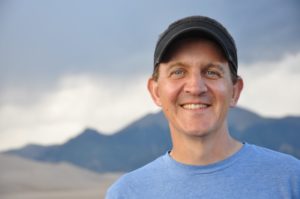 Eric Massanari is chaplain at Kidron Bethel Village in North Newton, Kansas. Eric is a member of the Mennonite Spiritual Directors Network.
Eric Massanari is chaplain at Kidron Bethel Village in North Newton, Kansas. Eric is a member of the Mennonite Spiritual Directors Network.
Here is a story from the fourth century Desert Fathers and Mothers of Egypt and Palestine:
Abba Amoun came to Abba Sisois saying: ‘When I read Scripture, I long to prepare elaborate comments, so that I will be ready to answer questions about it if I am asked.’ The old man said, ‘There is no need. It is better to speak the word simply, with a good conscience and a pure mind.’[1]
 The desire to have right answers at the ready, the desire to be relevant and responsive to any situation, the desire to be seen by others as in-the-know — these are such common human desires. So, we might be sympathetic to Amoun in this transparent moment as he expresses a longing that is driven more by self-interest than faithfulness.
The desire to have right answers at the ready, the desire to be relevant and responsive to any situation, the desire to be seen by others as in-the-know — these are such common human desires. So, we might be sympathetic to Amoun in this transparent moment as he expresses a longing that is driven more by self-interest than faithfulness.
Amoun invites me to think of things like weekly sermon preparation and the moments when I find myself struggling for just the right words to illustrate a point, or when I feel like I need to do just a bit more research on a thought in order to “back it up.” He invites me to consider those moments when I am offering pastoral care or spiritual direction and begin to feel like I am not being helpful enough or, even worse, holy enough! These desires arise from ego-consciousness, my need to prove myself or shore myself up in the eyes of others. I think, too, of those very ordinary conversations in which I’m suddenly pricked by something someone has said and feel a need to refute their point and defend my own.
Abba Sisois responds with gentle and wise counsel: speak simply, with a good conscience and a pure mind. I’ve also heard it stated this way: Listen more than you speak. When you speak, speak from the heart.
Speak from the heart of your true being. Trust that God has given you (and each person you meet along the way) truth to speak with your life.
Your speech may be with words, it may come through your actions, or it may flow when you are simply being present to someone in a loving way.
We do not need to have all the answers, and we don’t need to prepare well-defended positions just in case someone asks us the questions we most fear. It’s okay — perhaps it is even holy — to say, “I don’t know.” God asks only that we speak the truth we have come to know with love, and then remain alive with curiosity, listening for the truth God is speaking through others and through the world.
___________________________
[1] From Daily Readings with the Desert Fathers. Edited by Benedicta Ward SLG. Templegate Publishers: Springfield, Illinois.

